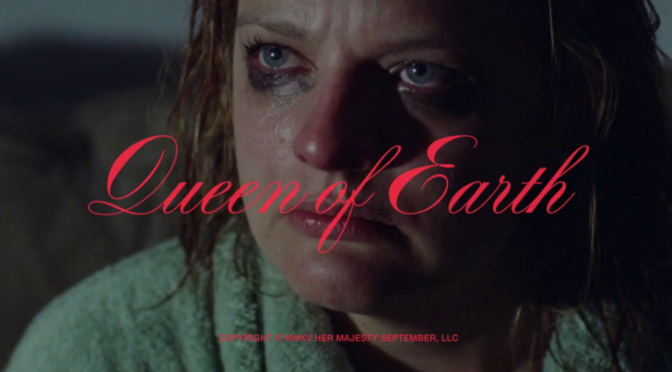A one-two punch of emotional trauma can be especially difficult for someone prone to always getting their way in life, and generally having things in order. Such is the case for Catherine Hewitt (Elisabeth Moss), the daughter and assistant of a celebrated New York City artist. After her father kills himself and her longtime boyfriend, James (Kentucker Audley), deserts her for another woman, the cracks in Catherine’s carefully constructed veneer begin to disseminate.
In her fragile state, she decides to return to the lake house where she spent last summer with her childhood friend, Virginia Lowell (Katherine Waterson, who, yes looks a lot like Sam at times). Although the two have known each other for most of their lives, the overt contempt they have toward one another–which is perhaps the sort of contempt you can only have for someone you’ve known so long–is palpable from the outset.
Virginia, or “Ginny” as she allows herself to be called by close friends, is still overtly bitter over the way things went last summer, when she needed Catherine’s support, but was instead blindsided by her choosing to bring James. We learn of the awkwardness of this trip via a series of disjointed (much like Catherine’s mind) flashbacks wherein, at one point, Virginia calls the two of them “cripplingly co-dependent.” It is the severity of this co-dependency that heightens the level of Catherine’s psychological fallout in the wake of the breakup. At times closed off to talking about her pain with Virginia, there are moments when she has outpourings of insight into her situation, as she does one evening while they sit on the couch and Catherine rehashes how she kept falling for the same trap in love (though we’re never made certain if it’s James she’s talking about). She tells Virginia, “This problem that I have, this issue that just keeps landing me in the same place–almost three years later, and here I was in the exact same place–was because I was more impressed with this handwritten note than his supposed changes in personality. You know, I saw this effort, this textile representation of his feelings, and I thought it was something real when it wasn’t.”
And this is very much the crux of Catherine’s issues: being taken in by the tangible rather than the abstractness of what’s real. When all signs of the corporeal that she once knew have vanished, it naturally leaves her in a state of panic, as her entire life was built on displays centered around that which could be manifested. Virginia’s response to her plight? “It’s one of the worst tendencies of human nature to assume the best of others.” In fact, Virginia’s aloofness in the face of Catherine’s overt breakdown is almost a sort of validation for her, proving that she was right all those years she spent not trying or caring about much of anything–existing in a reverie of stoic complacency supported by her affluent background. Because, what happens when you try? It hurts so much more when you fail. And there to join her in that pleasure is Rich (Patrick Fugit, a long way from his baby-faced aesthetic in Almost Famous), who has casually been sleeping with Virginia ever since they’ve been living near one another in this scantly populated countryside.
Catherine, conveniently forgetting that she already met Rich the summer prior, immediately takes a dislike toward him, seeing him as an imposition on her time with Virginia–which is, of course, an ironic twist of fate considering how Catherine brought James last time during Virginia’s existential crisis. With the signs of Catherine’s insanity becoming increasingly hard to ignore (e.g. insisting her face feels like all the bones are grinding underneath it), Virginia–and Rich, for that matter–seems to take an eerie delight in watching it unfold, stating frankly, “I always thought you were so perfect. I thought you had it all figured out. But you were just surrounding yourself with men. With James, with your father. Without them, here you are.”
It is in this moment that the essence of friendship–particularly among females (see: Charlotte Pingress)–is defined. And that definition is a need to triumph over the more “successful,” “put together” person in the end. Alex Ross Perry also has an innate knack for using Moss’ acting abilities to their utmost (based on their previous collaboration in Listen Up Philip) to evince the sort of terror he’s looking for from his audience. Catherine could be any one of us with the mere roll of a dice and the predictable betrayal of others we thought we could rely on in the past. Incidentally, during one scene, Virginia reads a book that Philip Lewis Friedman might have written, called Madness & Women. That title may have just as easily suited Queen of Earth.





















